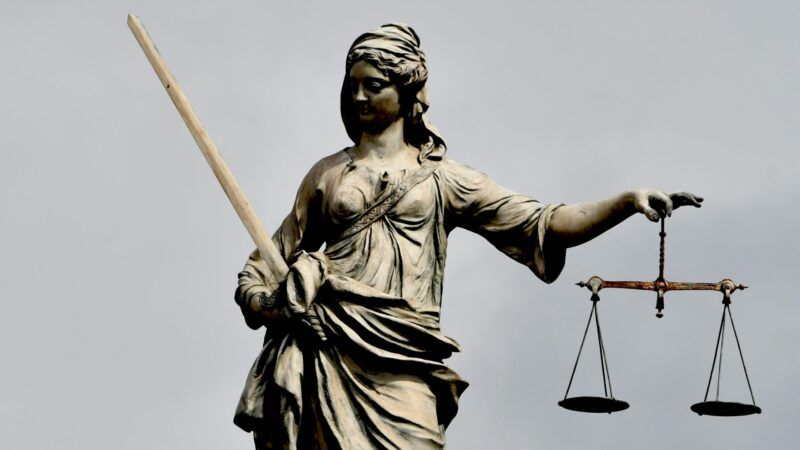Did 'Activist Judges' Derail Trump's Tariffs?
No. One of the judges in Wednesday's unanimous ruling was a Trump appointee, and the ruling rested on important legal and constitutional principles.

In the immediate aftermath of Wednesday's federal court ruling that blocked the Trump administration's tariffs on nearly all imports, the president's allies have turned to a predictable excuse for the sweeping legal defeat.
"It is not for unelected judges to decide how to properly address a national emergency," said Kush Desai, the White House's deputy press secretary, in a statement. "President Trump pledged to put America First, and the Administration is committed to using every lever of executive power to address this crisis and restore American Greatness."
"With activist judges, what is even the point of having a president?!" posted conservative pundit Charlie Kirk (in a tweet that inaccurately characterized just about every aspect of the legal ruling).
"The judicial coup is out of control," wrote Stephen Miller, the White House deputy chief of staff, on X.
These reactions are as inaccurate as they are lame. In Miller's view, apparently, a "coup" occurs when judges tell the president that he has overstepped the bounds of his powers under the law—rather than when a president seizes those expansive powers. That's a very silly definition of a coup.
More importantly, it's also a misleading description of what the Court of International Trade ruled on Wednesday. In this case, it was the Trump administration, not the court, that was claiming to be able to exercise unlimited, unchecked power by invoking a law. Trump had used the International Emergency Economic Powers Act (IEEPA) to impose tariffs on nearly all imports to the U.S., even though that law narrowly authorizes presidential actions only in response to "an unusual and extraordinary threat."
International commerce is plainly neither of those things, as the court concluded in its ruling. "We do not read IEEPA to delegate an unbounded tariff authority to the President," the judges wrote. "We instead read IEEPA's provisions to impose meaningful limits on any such authority it confers."
By reviewing the actions of the executive branch to ensure they comport with the underlying law, the Court of International Trade merely fulfilled the constitutional role of the judiciary.
"This ruling reaffirms that the President must act within the bounds of the law, and it protects American businesses and consumers from the destabilizing effects of volatile, unilaterally imposed tariffs," Jeffrey Schwab, senior counsel at the Liberty Justice Center, the public-interest law firm that represented the plaintiffs in the lawsuit before the Court of International Trade, told Reason in a statement.
In short, that's the opposite of a coup.
The claim that these were "activist judges" also doesn't stand up to scrutiny. For starters, one of the three judges who issued Wednesday's unanimous ruling was appointed by Trump. Judge Timothy Reif was nominated in June 2018, during the first Trump administration. The other two judges who decided the case were appointed by Presidents Barack Obama and Ronald Reagan. That seems like a pretty fair panel: A liberal, an older conservative, and a Trump appointee. All three agreed that Trump had overstepped his authority with the tariffs.
Additionally, the court's ruling leaned on two bits of jurisprudence that conservatives have long championed as a way for courts to check executive authority: the "nondelegation" and "major questions" doctrines. The former says, in effect, that Congress cannot delegate its core lawmaking authority to other branches of the government. The latter says the same thing in reverse: That major questions of policy must be decided by Congress, not the other branches.
The court found that Trump's tariffs failed on both counts.
In the ruling, the three judges wrote that "an unlimited delegation of tariff authority would constitute an improper abdication of legislative power to another branch of government. Regardless of whether the court views the President's actions through the nondelegation doctrine, through the major questions doctrine, or simply with separation of powers in mind, any interpretation of IEEPA that delegates unlimited tariff authority is unconstitutional."
The idea that these judges—a majority of whom were appointed by Republicans and who were exercising a pair of conservative legal theories in evaluating Trump's tariffs—were somehow unfairly biased against the president is simply laughable.
There may be some questions about the basic legitimacy of the Court of International Trade, which most Americans have probably never encountered. Let's put those to rest too.
The court was created by an act of Congress in 1980 to adjudicate disputes exactly like this one. Like in all federal courts, rulings from the Court of International Trade can be appealed—and the Trump administration has already indicated that it will appeal Wednesday's sweeping tariff ruling.
It's also somewhat telling that the Trump administration's lawyers have been trying to move other tariff-related cases into this court. Rather than viewing the Court of International Trade as illegitimate or biased, it seems like the administration believed that the court would be the friendliest legal venue for reviewing the president's claimed tariff powers—at least until Wednesday evening. (That belief was shared by many trade policy observers, including myself, who were skeptical that the courts would be willing to intervene in such a direct way to block tariffs imposed under the IEEPA.)
Whether as a legal matter or a practical one, Trump's allies are simply wrong when they claim that the administration is the victim of judicial activism in the tariff ruling. The Court of International Trade's decision to strike down the tariffs and draw clear lines around the president's emergency economic powers is well-reasoned and appropriate. It's also the sort of ruling that conservatives would be universally cheering if it were brought down against a Democratic president's power grab.
This isn't a judicial coup or an unfair result. Trump exceeded the limits of the power granted to him by Congress, and the courts put a stop to it. That's exactly how our constitutional system is supposed to work.


Show Comments (60)